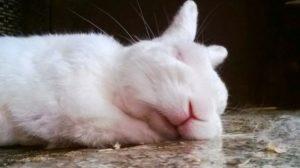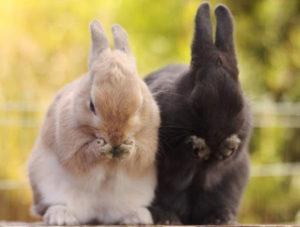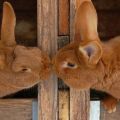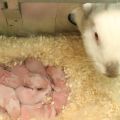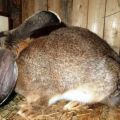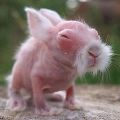How long does pregnancy last in rabbits and how to determine fertility, care
In the breeding of rabbits, okrol is an important stage in their life. A novice breeder should know all the nuances of this process, including how long pregnancy lasts in rabbits. After the mating of the animals, the female is fertilized. At this time, complete care of the individual, proper nutrition is important. With proper care, you can get full, healthy offspring.
How long do rabbits carry baby bunnies?
A pregnant female walks for 28-35 days. The length of time for bearing pups depends on several factors:
- The number of embryos. The more babies there are in the womb, the more difficult it is for them to develop. Therefore, okrol takes place ahead of schedule.
- The age of the woman in labor. For the first time after mating, the female gives a few offspring. Also, productivity decreases in aging individuals. Young animals have a larger number of rabbits, respectively, the period of bearing offspring is reduced.
- Rabbit breed. In breeds of small rodents, okrol passes faster. The larger the individual, the longer the period of bearing the rabbits.
- Mom's health. For the entire period of pregnancy, the rabbit needs special care, conditions of detention and good nutrition. Compliance with such measures contributes to the normal course of pregnancy and the release of healthy crumbs.
For one okrol, the female is able to bring from 4 to 12 cubs. On average, large breed rabbits give birth to offspring at 30-34 days. For example, representatives of the breed white giant, Californian, Soviet chinchilla. Rabbits are born with an average weight of 70-80 grams.
How to determine the fertility of a rabbit?
After mating, pregnancy is determined on the 14-15th day. For this, a visual examination is carried out, using the palpation method.
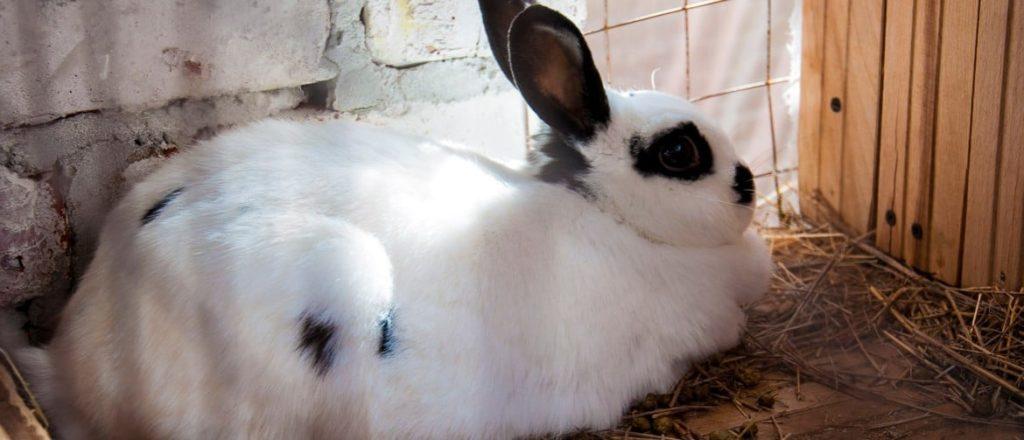
Physiological changes
You can check the success of mating by probing the female's abdomen. It is advisable to entrust these manipulations to an experienced veterinarian. For palpation, the rabbit is taken by the scruff of the neck and ears, held with the second hand. The thumb is placed on one side of the animal, the rest of the fingers on the opposite side. In the presence of pregnancy, embryos are probed in the female's abdomen. For comparison, an inexperienced breeder can palpate the belly of an individual that is not expecting a litter.
It is possible to determine the success of the fertilization of a rabbit by external signs, namely, by a rounded belly. A noticeable change occurs 7 days after mating. Although such a sign is not always visually determined. The longer the period, the more the belly grows, and it becomes more noticeable.
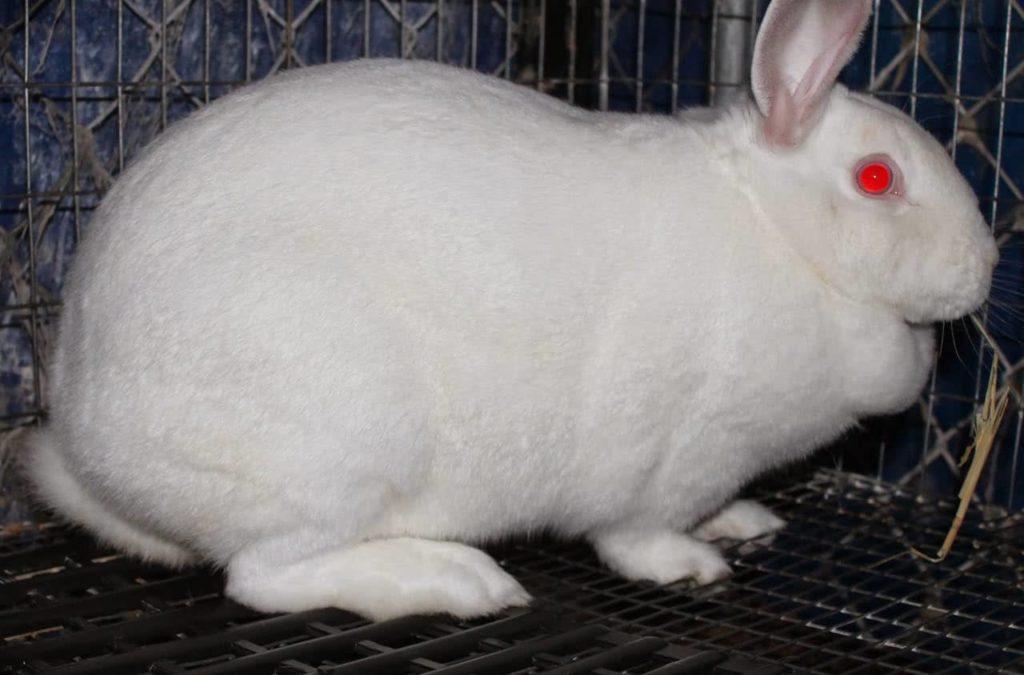
Before mating, the rabbit is weighed. The weight is then checked within two weeks after mating. With successful mating, the female gains weight from 200 to 400 grams within two weeks, looks larger than usual.
Changes in behavior
There are other behavioral signs of pregnancy in an eared animal. After fertilization, the individual avoids contact with the male. The farmer can find out the position of the rabbit by adding a rabbit to her 7-9 days after mating. A pregnant female will show aggression towards him, attack and even bite.
Some individuals become shy, begin to drag dry grass into the house. The feline rabbit makes a nest. She rips out the fluff on her chest, covers the bottom of the mother liquor for future offspring.
A rabbit that carries offspring begins to consume more water and food. She can throw food out of the trough, signaling that it is time for her to change her diet.

How to take care of a pregnant rabbit?
To maintain the health of the rabbit and her future offspring, it is necessary to provide adequate care, balanced nutrition, and a favorable environment.
Feeding
Immediately after mating, the female is provided with quality nutrition. A balanced diet guarantees the full development of fetuses, the appearance of healthy babies. The diet includes a variety of high quality feed. If the rabbit ate good food, it is impractical to change the diet, the breeder only increases the number of servings.
Experienced breeders recommend giving the pregnant female fresh hay in the morning. After lunch, the menu includes concentrated feed. It is imperative to introduce vitamins, minerals, useful micro and macro elements into the diet. Calcium is given in the form of chalk, bone meal.
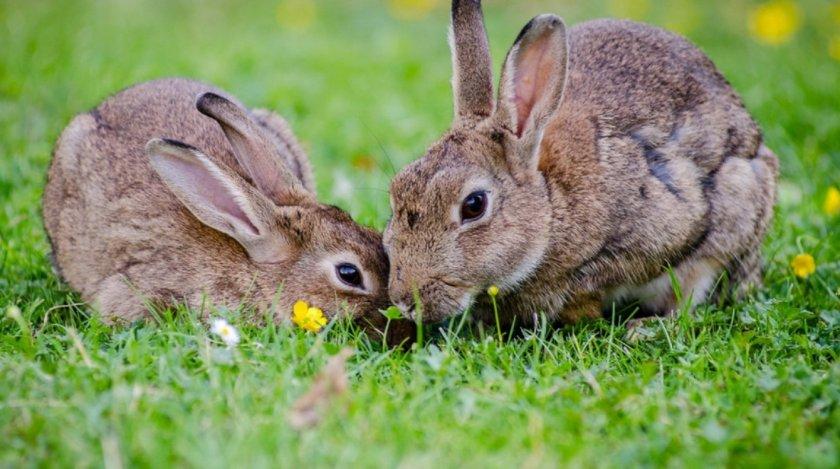
The power supply must include the following components:
- compound feed, oats;
- foods high in protein;
- fresh, hard vegetables;
- fish fat;
- minerals.
Important! With a lack of salt, the rabbit is able to eat the offspring. Therefore, there must be mineral supplements in the feeder.
Care
With the approach of the okrol, the breeder prepares the mother house - the place where the female will equip the nest. Usually it is built in the form of a box in which the animal can be safely placed. The container is made with sides so that the kids do not fall out of it. The bottom of the mother liquor is covered with dry grass, newspaper, sawdust.
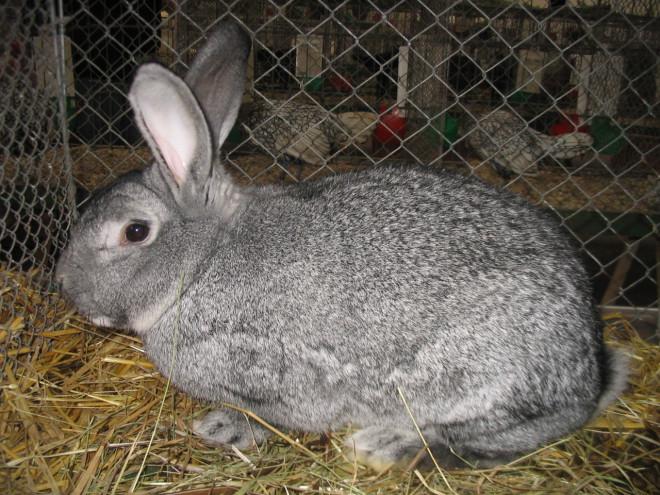
The house should always be clean, comfortable for the animal. For the cell, choose a quiet place without extraneous noise. It is advisable to darken the place of installation of the house, as bright light can scare a pregnant female.
Problems associated with pregnancy
Failure to observe proper care, improper nutrition of the rodent can cause health problems that lead to the death of the offspring. There are a number of problems associated with a rabbit's pregnancy:
- Mastitis - occurs in the absence of hygiene, cleanliness in the house. Contaminated milk is a real and fatal threat to babies. If such a danger appears, you should immediately seek help from a veterinarian.
- Toxicosis - intoxication of the body is not characteristic of all rabbit breeds. It occurs due to the lack of nutrients in the diet. The problem is eliminated by the introduction of a dropper with glucose to the animal.
- Eating newborn rabbits - various factors can be the reasons. These include: malnutrition, lack of salt in the body, malnutrition, stress.
During childbirth, it is important to monitor the condition of the rabbit. If the duration of the round-up exceeds the permissible limits, you will need the help of a veterinarian.
Rabbit breeding is a popular business, as breeding eared pets is considered profitable and easy. But here, too, attention is required from the farmer in order to obtain regular, healthy offspring.
